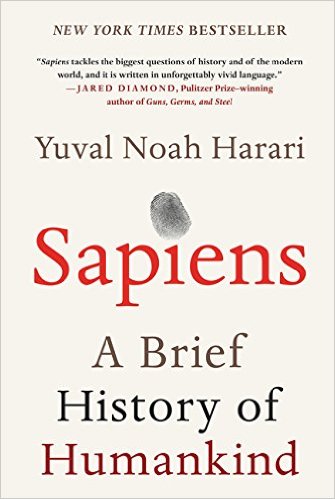Sapiens: A Brief History of Humankind is an extraordinary book. Very similar to Guns, Germs, and Steel: The Fates of Human Societies by Jared Diamond. It may not be directly related to innovation and start-ups, but below are some extracts I found striking. This is a must-read book…

By It is believed that the cover art can or could be obtained from the publisher.
Fair use, https://en.wikipedia.org/w/index.php?curid=48907980
“Consider the following quandary: two biologists from the same department, possessing the same professional skills, have both applied for a million-dollar grant to finance their current research projects. Professor Slughorn wants to study a disease that infects the udders of cows, causing a 10 percent decrease in their milk production. Professor Sprout wants to study whether cows suffer mentally when they are separated from their calves. Assuming that the amount of money is limited, and that it is impossible to finance both research projects, which should be funded?
There is no scientific answer to this question. There are only political, economic and religious answers. In today’s world, it is obvious that Slughorn has a better chance of getting the money. Not because udder diseases are scientifically more interesting than bovine mentality, but because the dairy industry which stands to benefit from the research, has more political and economic clout than the animal-rights lobby.
Perhaps in a strict Hindu society, where cows are sacred, or in a society committed to animal rights, Professor Sprout would have a better shot. But as long as she lives in a society that values the commercial potential of milk and the health of its human citizens over the feelings of cows, she’d best write up her research proposal so as to appeal to those assumptions. For example, she might write that ‘Depression leads to a decrease in milk production. IF we understand the mental world of dairy cows, we could develop psychiatric medication that will improve their mood, thus raising milk production by up to 10 percent. I estimate that there is a global market of $250 million for bovine psychiatric medication.’ […] In short, scientific research can flourish only in alliance with some religion or ideology.” [Pages 304-305]
So how science developed in apparently useless fields?
“The key factor was that the plant-seeking botanist and the colony-seeking naval officer shared a similar mindset. Both scientist and conqueror began by admitting ignorance – they both said ‘I don’t know what’s out there.’ They both felt compelled to go out and make new discoveries. And they both hoped the new knowledge thus acquired would make them master the world.
European imperialism was entirely unlike all other imperial projects in history. Previous seekers of empire tended to assume that they already understood the world. Conquest merely utilized and spread their views of the world. […] European imperialists set out distant shores in the hope of obtaining new knowledge along new territories.” [Page 317]
Ignoramus
[Page 279] “Modern science differs (mention Steve Weinberg here?) from all previous traditions of knowledge in three critical ways:
a. The willingness to admit ignorance. Modern science is based on the Latin injunction Ignoramus – ‘we don’t know’. It assumes that we don’t know everything. Even more critically, it assumes that the things we think we know could be proven wrong as we gain more knowledge. No concept, idea or theory is sacred and beyond challenge.
b. The centrality of observation and mathematics. Having admitted ignorance, modern science aims to obtain new knowledge. It does so by gathering observations and then using mathematical tools to connect these observations into comprehensive theories.
c. The acquisition of new powers. Modern science is not content with creating theories. It uses these theories in order to acquire new powers, and in particular to develop new technologies.”
[Pages 320-2] “The first modern man was Amerigo Vespucci.” [And not Columbus who contrarily to this lesser-known Italian sailor, was always convinced he had arrived in India and not on a new continent.] […] “Columbus stuck to this error for the rest of his life.” […] “There is poetic justice in the fact that a quarter of the world, and two of its seven continents, are named after a little-known Italian whose sole claim is that he had the courage to say, ‘We don’t know’. The discovery of America was the fundamental event of the Scientific Revolution.”
[This reminds me the day of my PhD oral presentation. A colleague of mine was surprised I dare answering ‘I don’t know’ to a question of a member of the jury. My colleague had also missed the point, I think…]
Chapters 14-16 describe how science, politics and economics are interconnected. They may be less surprising but are as convincing. Here is a disturbing extract: “Conversely, the history of capitalism is unintelligible without taking science into account. […] Over the last few years, banks and governments have been frenziedly printing money. Everybody is terrified that the current economic crisis may stop the growth of the economy. So they are creating trillions of dollars, euros and yen out of thin air, pumping cheap credit into the system, and hoping that the scientists, technicians and engineers will manage to come up with something really big, before the bubble bursts. Everything depends on the people in the labs. New discoveries in fields such as biotechnology and nanotechnology could create entire new industries, whose profits could back the trillions of make-believe money that the banks and governments have created since 2008. If the labs do not fulfill these expectations before the bubble bursts, we are heading towards very rough times.” [Page 352]

What should i think of Sapiens after all these year ? Reading « Au commencement était » (The Dawn of Everything) makes me wonder. If you do not have the courage to read this magnificent work, you can always read the brilliant analysis of Antoine Le Fèvre on https://horsduflux.com/au-commencement-etait-tentative-de-synthese/